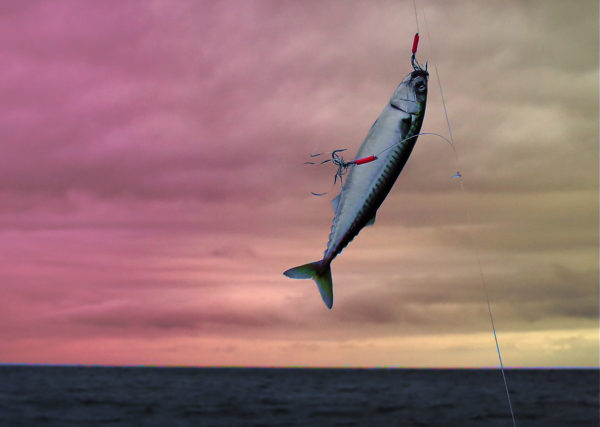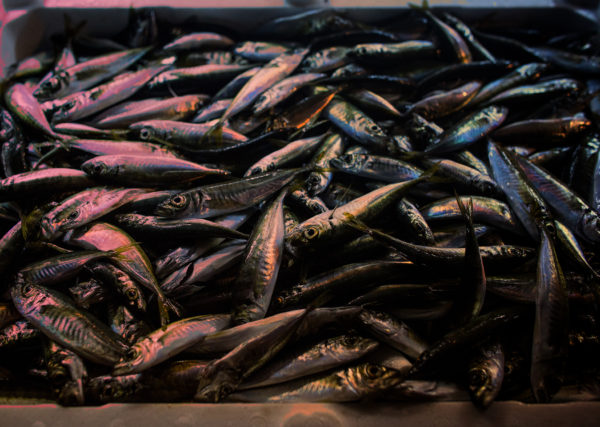Why the UK’s £200m mackerel haul is losing its ‘sustainable’ label
North East Atlantic mackerel – the UK’s most commercially valuable fish stock – is to lose MSC status after years of overfishing

The UK’s most commercially important fish stock is to be stripped of its eco-friendly certification tomorrow, following years of overfishing.
Independent auditors have announced that North East Atlantic mackerel caught after 1 March cannot carry the Marine Stewardship Council’s “blue fish” checkmark, which is given to wild-caught fish judged to come from a sustainable source.
MSC Europe director Camiel Derichs said “declining stocks”, “quotas set above new scientific advice”, and below-average numbers of mackerel reaching spawning age “have combined to mean that the fisheries no longer meet the MSC’s requirements”.
The decision came just weeks after Unearthed reported that the UK was on course to ditch a landmark EU legal commitment to end overfishing by 2020.
Overfishing
According to the International Council for the Exploration of the Seas (ICES), which provides governments with independent advice on catch levels, the amount of mature mackerel in the NE Atlantic has been in decline since 2011. Throughout that period the EU, Norway and other states that fish the stock have consistently set overall catch limits well above annual scientific advice.
An analysis by Unearthed has found that this period coincided with huge profits for the small group of firms that now holds most of the UK’s mackerel quota.
In 2017, the combined catch of the European Union and other coastal states like Norway and the Faroe Islands that fish the stock was 1,155,944 tonnes – more than double the maximum advised by ICES.
The following year, the estimated stock of mature NE Atlantic mackerel dropped to just 2,350,000 tonnes – below the ‘trigger’ level at which the guidance says governments need to act to keep the stock in a desirable range.
Andrew Clayton, of The Pew Trusts, which campaigns against overfishing, said: “The countries responsible for managing mackerel, including the UK, have been overfishing the stock for years. Last year their luck ran out, with scientists advising huge cuts, yet fishing ministers ignored this advice again for 2019, agreeing to continue overfishing mackerel despite the risks.
“This necessary step from MSC stems from short-sighted decision-making by governments, which is putting doubts in the minds of consumers and risking the jobs that rely on this valuable fishery.”

£200m industry
Mackerel is by far the most commercially important fish to the UK’s catching industry. In 2017, UK vessels landed 226,900 tonnes of mackerel, earning around £203m. Mackerel accounted for nearly a third of the total weight of fish and shellfish landed by the UK that year.
But the rights to fish the UK’s mackerel are concentrated in the hands of an unusually small number of businesses. Around 99% of the UK’s mackerel quotas are held or controlled by just 20 businesses. The five biggest holders alone control more than half of the UK’s mackerel fishing rights.
Fishing industry lobby groups argue that this consolidation is necessary, because most mackerel is caught in winter months hundreds of miles from shore and only huge, expensive trawlers can pursue these fish.
However, the recent years in which quotas for North Atlantic mackerel have risen sharply above scientific advice have proven highly profitable for those at the top of the UK’s mackerel industry.
In the five years from 2013 to 2017, Lunar Fishing Company – the UK’s biggest mackerel quota holder – reported pre-tax profits totalling £58m. Over roughly the same period, Interfish Limited, the second-largest mackerel quota holder, recorded pre-tax profits of £72m.
The third-largest mackerel quota holder – Klondyke Fishing Company – reported pre-tax profits totalling £76m and paid out dividends of £56m to its shareholders.
All three companies are owned or controlled by families on the Sunday Times Rich List.
Tagging data
A number of fishermen’s organisations have said they believe the ICES NE Atlantic mackerel assessment is wrong, and has been distorted by flawed data from tagged fish. They believe this has resulted in an unduly pessimistic assessment of the health of the stock.
Next week ICEs is holding a special meeting on the mackerel science, which the fishing industry believes will be the start of a process that leads to a change in the advice.
Speaking to trade magazine Undercurrent News when the decision was announced, Sean O’Donoghue, of the Republic of Ireland’s Killybegs Fishermen’s Organisation, said: “”The ICES advice for mackerel, I can assure you, is wrong.
“They’re looking at it now in the first week of March, and they’ll be looking at it more comprehensively in May, but I’m very confident that there will be a significant upward revision of the scientific advice.”
However, conservationists point out that – whatever flaws there might be in ICES most recent assessment of the stock – mackerel quotas have been set significantly higher than scientific advice every year for the past decade.
Mr Derichs of the MSC said: “There is already work underway to review the way mackerel stocks are assessed. The fisheries have confirmed that they will work with management authorities to, as appropriate, adopt measures enabling recovery of the stock. If successful, that may enable reinstatement of the MSC certificates by the certification bodies.”
However the MSC statement added that even if the estimate of the size of the mackerel stock was revised upwards, this would “not solve the ongoing challenges on sharing the stock or fishing above the scientific advice”.

